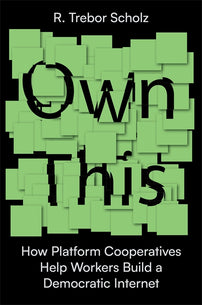Scaling Platform Coops to a Digital Cooperative Commonwealth
In Part 2 of our Own This! roundtable, James Muldoon reflects on the challenges of building a cooperative society through the example of the nineteenth-century US labor association, the Knights of Labor.

In 2014, a bold and compelling post outlining an alternative to the rise of the gig economy was widely read and distributed across the world. This was Trebor Scholz’s ‘Platform Cooperativism vs. the Sharing Economy’. It offered a sharp critique of the ownership and governance structures of companies such as Uber and Airbnb that enabled new forms of hyper-exploitation of workers and users. The post was followed by a successful conference organised by Scholz and Nathan Schneider in New York City, which galvanised an emerging global movement. Nine years on, and Scholz’s latest book, Own This: How Platform Cooperatives Help Workers Build a Democratic Internet can be seen as the culmination of years of experience at the hub of a global network of platform cooperatives.
While the initial paper was filled with catchy slogans and direct comparisons with corporate models, Scholz’s latest book sets out a more developed and integrated plan for how cooperatives could continue to expand beyond small groups of workers. In this latest formulation, cooperatives are not so much the answer to all the problems of the sharing economy as they are one important model among others that contributes to a more plural and democratic digital economy.
One of the most central questions of the movement remains the issue of scaling and size. If cooperatives provide so many benefits to workers and represent a truly a superior model, why, a decade after their creation, do we not see more and bigger platform cooperatives in the world? Scholz is ideally placed to answer this question and provides some interesting lines of thought.
His starting point is that we shouldn’t always try to directly compare platform cooperatives with corporate platforms. They do not represent a mirror of venture capital logic, which priorities growth for its own sake and attempts to maximise profits as the ultimate goal of the business.
[book-strip index="1"]
Scaling, for Scholz, could involve an expansion of operations, but it also entails maximising a broader range of social goods, such as deepening relationships within a community and providing a better service for stakeholders. He emphasises that there is no one-size-fits-all and that what is right for any particular cooperative will depend on the unique characteristics of the business, industry and community.
Rather than copying the global and hegemonic model of corporate platforms, Scholz turns to the idea of federation and the logic of autonomous but connected cooperatives as a way of modelling the growth of platform coops. In a federated model, multiple smaller cooperatives can collectively own and manage a shared digital platform, potentially in different geographic locations serving different clients.
The advantage of a federated model, and its appeal to many political actors throughout history from the American Revolution to the Spanish anarchist’s federalism during the Spanish Civil War, is that it allows for largely free and autonomous units to combine into a larger grouping while still maintaining their independence. Federalism provides more opportunities for mindful and participatory processes within cooperatives and prioritises democratic governance and deepening relationships.
The question remains as to whether this model will be sufficient to increase the overall number of cooperatives and to present a mainstream alternative to corporate platforms. Scholz is right to want to broaden discussion away from simply comparing platform cooperatives to the Googles and Ubers of the world, but there is a lingering problem that a federal model has not historically proven as strong or competitive as a more centralised model of organisation. Despite organisational efforts, platform cooperatives still face significant challenges in competing in the broader digital economy and seem to face insurmountable obstacles to further growth in their current form.
This is not to say they should simply adopt the tactics of their rivals, but this does pose a seemingly intractable problem: either stay small and marginal or try to grow by potentially betraying some of the original principles upon which they were founded.
Scholz’s answer to this is to look beyond the individual cooperative and to seek support in a broader array of political and economic institutions that could create a fertile ecosystem in which cooperatives could flourish.
This requires investment institutions such as cooperative banks, sympathetic foundations and investment funds that could provide capital under conditions conducive to cooperative businesses. It also necessitates political and regulatory structures that would enable cooperatives to thrive in what is currently a largely corporate world. Local councils and other public institutions could provide favourable contracts for cooperative businesses through procurements, just as national governments could create tax incentives and hassle-free ways of creating cooperative structures.
This is what Scholz refers to a ‘systems or an ecosystem approach,’ one that attempts to nestle cooperatives within a supportive environment of institutions working towards a common vision. This approach finds common ground with many other leftist visions of cooperative economics, including my own work in Platform Socialism: How to Reclaim our Digital Future from Big Tech. The issue with this framing is that there are limited examples in the world of such an approach working in practice. Scholz gestures to Mondragon, but as many studies have shown, this example could only be described as a partial success under very specific conditions which would be difficult to replicate in other countries.
[book-strip index="1"]
How could cooperative forms of organisation be expanded further still to incorporate a whole society built on cooperative principles? Could an economic system still function with a cooperative rather than competitive dominant guiding principle?
To address this question, Scholz turns to the example of the Knights of Labour (KOL), a vibrant but short-lived labour association that briefly flourished in the mid 1880s in the United States. KOL were neither a labour union nor a cooperative, although at times they acted as both. The Knights advocated for the eight-hour workday, occasionally negotiated with employers on behalf of its members and were also notable in organising across race and gender lines.
KOL are important to the co-operative tradition because they believed that cooperativism was an essential principle for a fair society and wanted to organise cooperative institutions to replace the wage system. Local Knights assemblies set up many of their own co-operatives from newspapers and textile mills to mines and farms.
Scholz finds the spirit of the KOL in a number of contemporary cooperative labour associations such as the Drivers Cooperative in New York City and the South Korean Association of Alternative Drivers. The vision is for the formation of labour associations that draw from the histories of both the union movement and the cooperative movement to form a hybrid union/cooperative model for building associational power in the digital age. This would be something similar to the KOL but that could bring together traditional unions with co-operatives in the gig economy.
There is a tension in such an approach based on the different functions cooperatives and unions are created to perform. Unions negotiate with employers on behalf of employees, while co-operatives are designed to eliminate the need for a separate class of employers altogether.
What does it really mean to combine these two models into a single association? Unions have on occasion worked alongside cooperatives, but, understandably, the two find very little common ground in their organisational objectives.
Instead of forming a hybrid between a cooperative and a trade union, the KOL aspired to create a co-operative commonwealth with the basic proposition ‘to abolish as rapidly as possible, the wage system, substituting cooperation therefore.’ As Alex Gourevitch has shown in his book on the KOL, they considered that wage labour did not grant workers full independence and freedom and that only an economy built on interdependent producer and consumer cooperatives could eliminate the forms of unfreedom workers experienced in the labour market.
The Knights envisioned cooperative production rapidly expanding to form something of a state within a state that was more centralised and large-scale than anything other utopian socialists such as the Owenites and Fourierists had imagined. This idea of a cooperative commonwealth was novel because it was industrial rather than agrarian and it was based on producer cooperatives working together within a cooperative society.
[book-strip index="1"]
Much of Scholz’s book is focussed on the more immediate and practical questions of how co-operatives can build and grow their business in the face of stiff competition from corporate platforms. The question of scaling is raised and tackled head on, yet for many readers I am sure this would remain on of the largest question marks over the prospects of the platform cooperative movement. Almost a decade on from its initial launch, many of the core examples of successful platform cooperatives remain the same, and of these, a number remain the same size.
To be sure, there has been much growth and development over these years, both of individual cooperatives and of the movement as a whole, but the question of how a cooperative principle could be further expanded beyond the margins remains an important question for the broader movement.
← Read Part 1 of our Own This! roundtable
Read Part 3 of our Own This! roundtable →
Dr James Muldoon is Reader in Management at the Essex Business School and a Research Associate at the Oxford Internet Institute.
